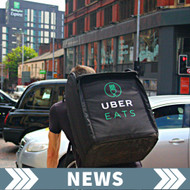Uber Eats Bans Thousands of Couriers in Crackdown on Illegal Workers
Posted by Emma on 5th Mar 2025 Reading Time:
The gig economy faces renewed scrutiny as Uber Eats has removed thousands of couriers from its platform in response to growing concerns over illegal working practices. The crackdown follows mounting pressure on delivery platforms to tighten their vetting procedures and prevent undocumented workers from abusing loopholes in the system.
Uber confirmed that it has blocked hundreds of courier accounts each month since entering an agreement with the UK Home Office last year. The deal introduced stricter right-to-work checks to ensure that only individuals with legal employment status can operate on the app.
Tighter Controls Amid Rising Concerns
The issue stems from the substitution system, a legal provision under UK employment law that allows self-employed workers to delegate their shifts to others. However, concerns have been raised that undocumented migrants are exploiting this practice, enabling them to bypass official employment checks.
Delivery platforms, including Uber Eats and Deliveroo, have responded by implementing more stringent verification measures. Uber Eats now conducts random identity checks, requiring riders to submit selfies to confirm their identity while on duty. New couriers and their substitutes must also undergo video-based verification to prove their legal right to work in the UK.
Robert Jenrick, former immigration minister and now shadow justice secretary, has been vocal about the risks posed by the substitution system. He warned that it fuels illegal migration and worker exploitation, urging delivery companies to take greater responsibility for their workforce.
A Sector-Wide Effort to Combat Illegal Working
Major delivery companies, including Deliveroo, Uber Eats, and Just Eat, pledged to strengthen their right-to-work checks in response to growing political and regulatory pressure. These new policies came into effect in August last year.
Despite these efforts, the scale of the problem remains significant. In October, police uncovered a makeshift encampment near Bristol, where dozens of undocumented migrants were found living while working as couriers. The raid resulted in 17 arrests, with 13 individuals taken to immigration detention centres.
Meanwhile, a private study revealed by The Telegraph in January estimated that as many as one million illegal migrants could be working in the UK, highlighting the challenge of enforcing employment regulations in the gig economy.
Deliveroo recently disclosed to MPs that it had dismissed over 100 couriers whose substitutes failed to provide valid right-to-work documents. The company was the first in the sector to introduce enhanced vetting procedures.
Uber Eats Responds to the Crisis
Uber Eats has confirmed that thousands of couriers have been removed from its platform since introducing stricter controls last April. A company spokesperson stated:
“All couriers who use the Uber Eats app, whether it is the account holder or their substitute, must undergo checks to ensure they are over 18 and have a legal right to work in the UK. Suppose a courier has been flagged for any breach of our community guidelines, including unlawful or unsafe behaviour. In that case, we investigate and take appropriate action on the account, including permanently removing access to the app.
“We are constantly reviewing and improving existing processes to ensure they are as robust as possible.”
The crackdown signals a shift in how gig economy platforms are tackling illegal employment, but questions remain about whether these measures go far enough. With the number of undocumented workers in the UK reportedly in the millions, policymakers and businesses alike face an uphill battle in ensuring compliance and protecting legitimate workers.




